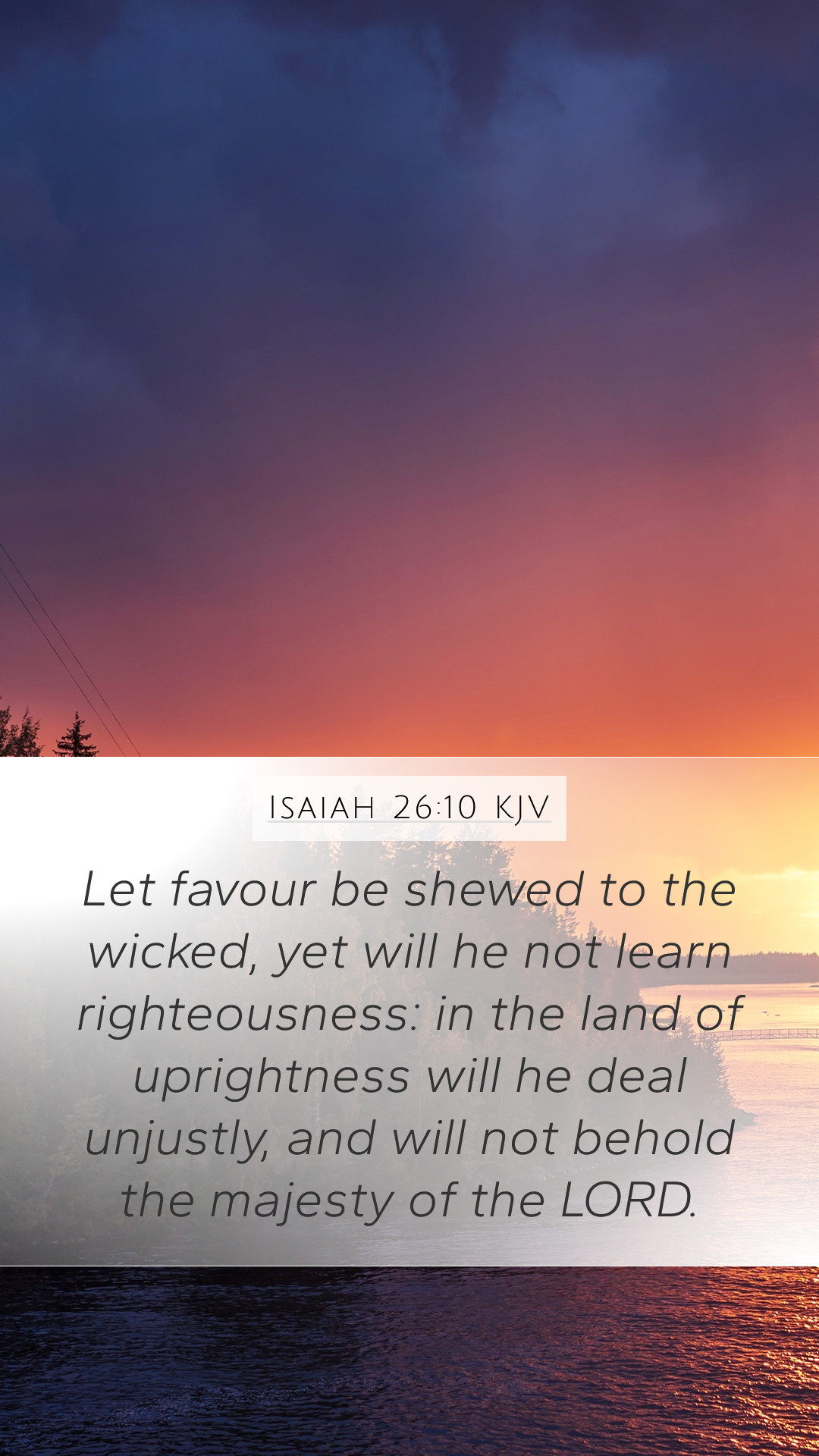Bible Verse Interpretation: Isaiah 26:10
Verse: "Let favor be shown to the wicked, yet will he not learn righteousness: in the land of uprightness will he deal unjustly, and will not behold the majesty of the Lord." (Isaiah 26:10)
Understanding Scripture: Context of Isaiah 26
This verse appears in the context of a prophecy concerning the fate of the wicked and the righteous. Isaiah communicates a strong message about the nature of humanity and the persistent rebellion against God, even when divine favor is extended. It serves both as a warning and a deeply insightful commentary on the state of the human heart.
Bible Verse Commentary
According to Matthew Henry, this verse illustrates the idea that even when God's grace is made available, the wicked fail to respond positively. Instead of learning from His favor, they continue in their unjust ways, showing the hardness of their hearts. This speaks to the innate tendency of humanity to reject good, even when it is right before them.
Albert Barnes expands this thought by highlighting that the ‘wicked’ here refers not only to those who openly rebel but also to those who receive God's kindness yet remain unchanged. It emphasizes a common experience in life where individuals may witness the goodness of God but choose to ignore it, leading to their own destruction.
Adam Clarke further elaborates that the 'land of uprightness' symbolizes not merely a physical space but a spiritual condition where justice and righteousness should prevail. The refusal of the wicked to acknowledge the 'majesty of the Lord' indicates a profound level of spiritual blindness and ignorance towards God’s power and authority.
Key Themes in Isaiah 26:10
- Human Rebellion: The persistent rebellion of humanity against God's righteousness.
- Divine Favor: The idea that God's kindness does not guarantee repentance or change.
- Spiritual Blindness: The inability or refusal to see and acknowledge God's majesty.
In-Depth Bible Verse Analysis
When conducting a Bible study analysis, understanding the heart's condition is crucial. Verse 10 serves as a reflection of how external conditions—God's grace—do not necessarily change a person's internal disposition. The wicked’s failure to learn righteousness signifies a true understanding of sinful nature’s rebellion, which is an overarching theme in many Scripture passages.
Application of Isaiah 26:10 in Daily Life
This verse invites believers to reflect on their own lives. Do we recognize God’s favor and respond with gratitude and righteousness? Or do we take God's kindness for granted? Acknowledging God’s majesty is pivotal for a life that honors Him. This reflects a broader call to humility and repentance.
Conclusion: Biblical Exegesis of Isaiah 26:10
This verse is a profound reminder of the nature of sin and God's grace. It challenges believers to encourage one another in Bible study groups and personal study to not only seek knowledge but to also embody righteous living that reflects God’s majesty. The insights offered by Biblical commentators provide a vital framework for anyone interested in exploring Bible verse meanings and interpretations.
Related Cross References
- Romans 1:20 - The accountability of humanity to God's creation.
- Jeremiah 5:3 - The obstinacy of rebellious hearts.
- Proverbs 29:1 - The consequences of refusing correction.
In summary, Isaiah 26:10 encapsulates crucial insights regarding the human condition. The meaning of Bible verses often reveals the struggle between divine grace and human rebellion, encouraging a deeper engagement with Scripture and a more profound understanding of God's nature.


